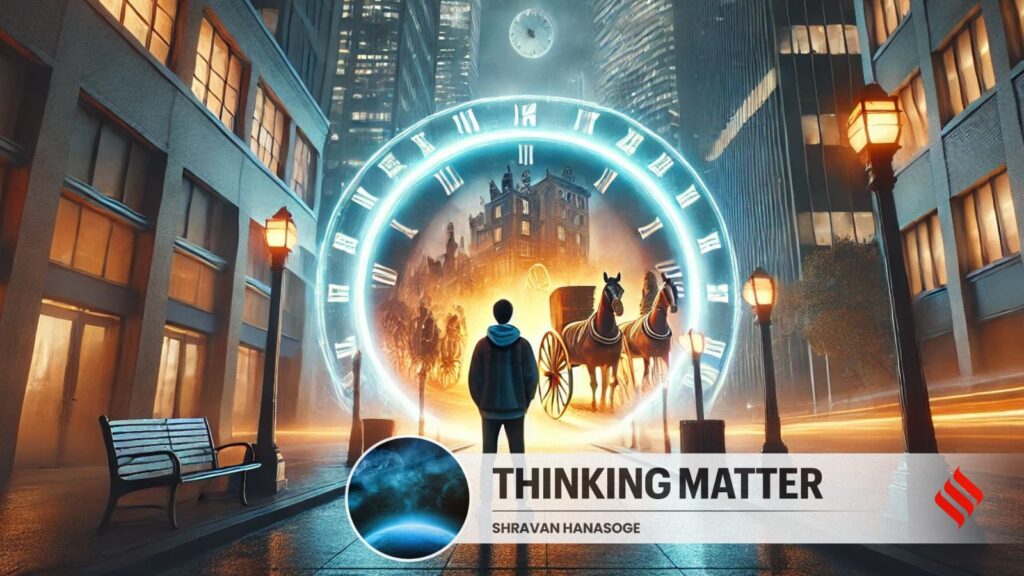Time travel has been part of the popular imagination for long. From science fiction classics like The Time Machine and Back to the Future to contemporary films like Interstellar played on the notion of slipping through time — whether to witness the past, and even be a part of it, or to glimpse the future.
But the very idea raises profound questions about physics, causality, and the nature of reality itself. Is time travel possible? And if so, under what conditions?
The roots of a fascination
Time travel as a concept predates modern physics. H.G. Wells’ The Time Machine (1895) introduced it as a literary device, but it wasn’t until the 20th century that science began to grapple with the possibility in earnest. Albert Einstein’s theory of relativity showed that time is not absolute or constant — it can stretch and compress depending on the speed at which you travel and gravity.
In 1949, the logician Kurt Gödel, a close associate of Einstein, proposed that under certain exotic conditions — such as a rotating universe — it might be possible to trace a path through spacetime that loops back into the past.
Einstein was reportedly disturbed by the implications. Although his equations didn’t explicitly forbid time travel, they suggested a universe far stranger than he was comfortable with.
Moving forward is easy. Backward …
In fact, we’re all time travelers, constantly moving forward at the steady rate of one second per second. But general relativity allows for more dramatic effects. Clocks on high-speed spacecraft or near massive objects like black holes tick more slowly relative to those on Earth, a phenomenon confirmed by experiments using atomic clocks on airplanes and satellites. This is why astronauts on the International Space Station age a tiny bit more slowly than the rest of us.
Traveling backward in time, however, poses far greater challenges. Theoretical constructs such as wormholes — shortcuts through spacetime — or closed timelike curves might permit backward travel, at least on paper. Physicists like Kip Thorne have explored these ideas, but all rely on speculative ingredients like “negative energy,” which has never been observed in the required form or quantity.
Story continues below this ad
Paradoxes of time travel
Even if time machines could be built, they raise troubling logical paradoxes. The most famous is the grandfather paradox: what happens if you travel back and prevent your grandparents from meeting? If you were never born, how did you travel back in the first place?
One proposed resolution is the Novikov self-consistency principle, which asserts that any events in the past caused by a time traveler must be consistent with the history that gave rise to the traveler. Alternatively, some theories in quantum mechanics suggest the existence of branching universes — where each change spawns a new, parallel timeline, thus avoiding contradictions.
Still, the paradoxes remain a sticking point. Stephen Hawking, a noted skeptic, once hosted a “party for time travelers” but sent out the invitations only after the event. No one came.
Time travel in popular culture
Science fiction has explored these dilemmas with enthusiasm and creativity. In Back to the Future, small changes to the past ripple through to the present. In Interstellar, time dilation near a black hole causes years to pass on Earth in what feels like minutes to the protagonist — a scenario rooted in real physics. And in Avengers: Endgame, quantum time travel is introduced, though it serves more as narrative convenience than scientific plausibility.
Story continues below this ad
These portrayals, while imaginative, underscore the central challenge: even if time travel is mathematically permitted, making it physically possible is another matter altogether.
So, Will it ever happen?
At present, there is no experimental evidence that time travel to the past is possible. Most physicists believe that quantum effects, energy constraints, or deep features of spacetime geometry would ultimately prevent it. Some even argue that time travel could violate the second law of thermodynamics, which dictates that entropy — disorder — always increases, thereby giving time its “arrow.”
Nevertheless, time travel remains a topic of legitimate scientific exploration. It tests the boundaries of our understanding of spacetime and causality. It also tests the interplay between general relativity and quantum mechanics — two theories that, to this day, remain fundamentally incompatible.
A final reflection
Why are we so fascinated by time travel? Perhaps because it represents the ultimate form of agency — the power to revisit lost moments, correct mistakes, or witness beginnings. But time, for now, seems to move only forward.
Story continues below this ad
Still, as our theories of the universe deepen, and our technology improves, the question remains open — even if only slightly. Until then, time travel may continue to thrive best not in laboratories, but in the pages of books and on cinema screens, where imagination travels faster than any particle known to physics.
Shravan Hanasoge is an astrophysicist at the Tata Institute of Fundamental Research.


